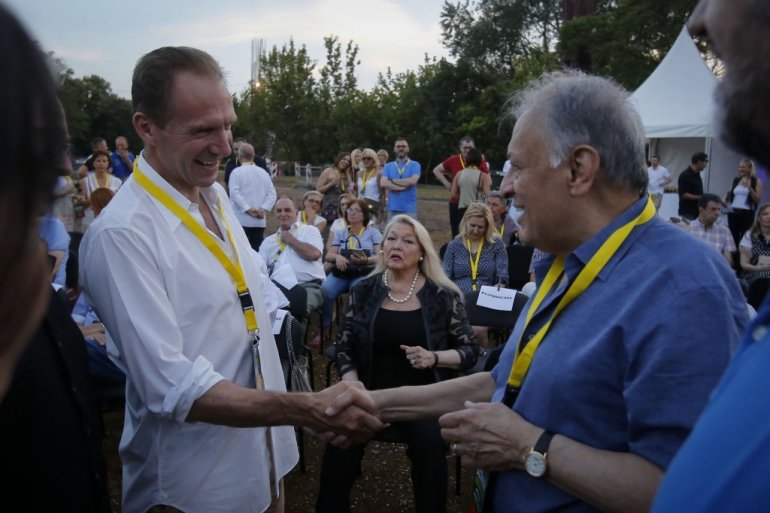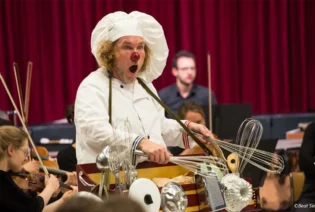
“Belgrade feels like a cosmopolitan city and has a major role in my career,” the film star said in an exclusive interview for the fifth issue of the Filharmonija Magazine in the Srpski telegraf, on the eve of a new meeting with friends in Serbia.
The Serbian premiere of the film “The White Crow,” directed by celebrated actor Ralph Fiennes, was held on 23 February as part of the 47th FEST, (Belgrade Film Festival).
That same night, the film star received the Beogradski pobednik – Belgrade Victor Award – for his past work. Fiennes has been granted Serbian citizenship and is a very dear guest in the Serbian capital, with which he has had a special relationship ever since his director’s debut in “Coriolanus,” which was filmed here. His newest motion picture was also filmed partly on location in Belgrade and was financed from the Serbian budget, plus the fact that the Belgrade Philharmonic plays an important role in the story of the legendary Russian ballet dancer, Rudolf Nureyev. In addition to business connections and official visits, the famous filmmaker now has friends to return to in Serbia. Speaking to the Filharmonija Magazine (monthly supplement to the Srpski telegraf), he says he does not hide the fact that he warms up his slightly reserved English mentality with a local specialty…
Actor on List of Most Influential People in Britain
Ralph Fiennes has won over film viewers and the critics with his thought-provoking, multi-layered and profound roles in the “English patient” and “Schindler’s List.” For aficionados of a slightly different genre, this outstanding theater actor has shown a completely different face in the horror thriller “Red Dragon.” He has haunted the youngest viewers for years as Lord Voldemort in the Harry Potter franchise, but he dispelled this bad rap in an interview in which he said that anyone who though Voldemort was really scary had to know that he, the lanky Fiennes, wore tights under his robe that he could barely pull up to his knees because, as he explained, they did not have a bigger size in the costume wardrobe. He is the eldest of six very talented children of photographer Mark Fiennes and writer Jennifer Lash. Fiennes appeared on Debrett’s 2017 list of the most influential people in the UK, and since 1999 he has served as an ambassador for UNICEF UK.
The Dancer Who Stunned the World
The film “The White Crow” talks about Rudolf Nureyev, legendary Russian ballet dancer, who pulled off an outrageous scandal when he defected from the USSR to the West in 1961, at the height of the Cold War. In this film, Fiennes gives an insight into the artist’s early life – the film begins with his birth in a Trans-Siberian train and follows him on his road to becoming one of the greatest male ballet dancers of his generation. On his travels abroad, Nureyev was accompanied by the KGB and his conduct was strictly limited, but nevertheless he had the opportunity to acquire important friends, such as Parisian socialite Clara Saint (Adèle Exarchopoulos), who was able to help him get political asylum. The story naturally culminates at the moment when Nureyev decided to escape his minders and never return to the Soviet Union. The film cast includes Oleg Ivenko, Ralph Fiennes, Louis Hofmann, Sergei Polunin, Adèle Exarchopoulos.
*Politically degraded, financially devastated and socially fractured after the ’90. and the bombing in 1999, Serbia seemed like a decent destination for filmmaking to you. What brought you here despite it all?
I was looking for locations for Coriolanus. I needed to find a big city which would provide alot of urban locations – market places, Senate, streets with contemporary apartment blocks etc. I needed a city that had a bruised quality and Belgrade offered a wealth of locations which suited my concept of a version of Rome today.
*Some would say that you now have at least 62 million reasons to feel like home in Serbia. If you ever got the time and opportunity, what made you relate and feel like a true Serb?
Belgrade feels like a cosmopolitan city. There’s an expansiveness and generosity to the Serbian character. I’ve been made to feel very welcome. But I’m English! And I can be a bit reserved and cautious. I’d like a big injection of Serbian soul. I’m not a true Serb yet!
*Through your work, you show that you are politically and socially aware as an artist. Is it even possible to be relevant and responsible as an artist, if you were to disregard the political conotations from your work?
I suppose as I get older I’m more aware of the political and social aspects of work I’m engaged in. And yes, they are important considerations to me. It’s a big question – what are the responsibilities of an artist? I think you spend your life trying to answer it. It’s important to keep a sense of humour too. Not everything has to be relevant.
*After Shakespeare, what dragged you into the lifestory of Rudolf Nureyev?
The spirit of Rudolf Nureyev dragged me into the life story of Rudolf Nureyev.
*Where do you feel most comfortable – in front or behind the camera and how do actor and director get along?
I think I’ve become a bit more confident behind the camera. It’s probably never a good idea to be too comfortable whether acting or directing but confidence is important in both roles. If your confidence is knocked it can be tricky. Actor and director get on fine, sometimes they have little disagreements
*After the succes of “Schindler`s list” did you think it was the very peak of your career or is it yet to come?
I don’t think it is healthy for actors to worry about the peaks of their career. Certainly I was aware that Schindler’s List was an enormous success at the time. The fate of any film is never known. The most important thing is to be the best you can.
*The music from this movie, it`s like it has a life of it`s own. How carefully do you choose music for your films and what is the most important to you in this matter?
Generally I am wary of too much music in films but of course this is a film about the young Nureyev so there was going to be music. There are quite a few excerpts from famous ballets but my collaboration with Ilan Eshkeri has been a very creative one and his music emerged from many discussions. Its been very exciting to hear how Ilan develops the score.
*And how helpful was the Belgrade Philharmonic in making music for the “White crow”?
The Belgrade Philharmonic was instrumental in giving us our key ballet scores. It was very exciting to hear them play the music for the film. I’m deeply grateful.
*We know for sure, the musicians were thrilled to meet you, but how do you remember that encounter?
I remember the musicians worked very hard and it was a privilege to listen to the recording sessions.
*How do you cope with fame after years and years of being a celebrity, how do you stay down to Earth?
My privacy is important to me. Having good friends and family support is a good way of staying down to earth. Anyway the idea of celebrity is a complete illusion. Alot of it is bullshit.
*According to news channels, the world is a very bad place. Millions of people are homelesses, in a flight from wars, famine, unions are being wrecked… Do you see a silver lining? Is there a warm and safe place, reason to keep going on?
It’s hard to keep a completely optimistic view of the world.
*You are this year`s laureate at the Belgrade International Film Festival FEST. After the highest accolades you received in your profession, what does this award mean to you?
To receive this Laureate at this year’s Belgrade Film FEST is undoubtedly something special for me. Making two films in Belgrade, two films which have been very important to me and both films that I have directed, there’s no question that Belgrade has played a huge part in my working life. I am deeply honoured.
*What would be the next reason to come back to Serbia?
To see friends, to drink dunja, to make a film!






